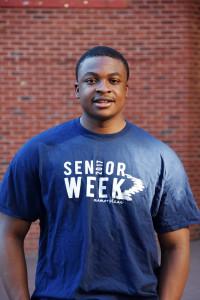
Georgetown reminds me to always check the mail. However thin the envelope might have been, its contents have led me to this moment today. Since making my decision to attend Georgetown, there have been a number of moments along the way that will make me cherish this experience for a lifetime.
Yet, what I did not quite understand before arriving at Georgetown was what made the Hilltop special. We often hear about the accolades of distinguished alumni like Bradley Cooper (COL ’97) or faculty, including former Secretary of State Madeleine Albright and political strategist Donna Brazile, but I have come to realize that it is the individual people brought together in this community who make it special.
The friendships that I have made on the Hilltop, with students from all over the world, are what pushed me every day to be my best self despite the challenges I may have faced along the way. They are the ones that are there for me in tears and in joy — in As and in Ds. Though the Ds part is a joke, in all seriousness, there is one thing you cannot escape when you talk about Georgetown students: passion.
A moment that comes to mind when I think about that passion is my dedication to sharing professional development resources with low-income students like myself. As a member of the student board of the Georgetown Scholarship Program, I put all this work into planning an event on imposter syndrome. Imposter syndrome occurs when you are uncomfortable being yourself because you have the idea that you are not qualified to be in a space or get an opportunity, and that sooner or later, you will be found out as an imposter.
Despite my hard work, on the night of the big event, only eight people showed up. I thought my passion to make a difference had gone to waste. But when I got home and logged onto Facebook, I saw that a freshman girl who had attended the event had shared a long reflection. She described how much the event affected her, teaching her not to downplay her accomplishments, but rather to use them as examples of great things she has done, and the power she has to do more — all while encouraging others to do the same. My passion for this topic had touched one person and that was enough for me.
I see myself in her reflection. I too had experienced moments like this early on in my Georgetown career, where student-led action resulted in deep personal growth. As a young sophomore, I had the opportunity to go on a trip led by seniors to Ferguson, Mo., for a weekend of actions to address police brutality.
When I was on the ground those days with Hoyas from across the country, I got a look beyond the dominant media depictions of Ferguson; it also allowed me to realize the power of building communities across boundaries to effect change for the better, no matter where we find ourselves. When I returned to Georgetown, I realized that this formative experience was possible only because I was in the right city with the right people at the right time. Living in our nation’s capital with fearless Hoya mentors during the rise of the Black Lives Matter movement, I grew into my identity.
Another moment that comes to mind is when, at the beginning of my junior year, through the recommendation of my mentor and confidant Special Assistant to the President Fr. Raymond Kemp, I had the honor of being appointed to the Working Group on Slavery, Memory, and Reconciliation by University President John J. DeGioia. Through the Working Group, I had the privilege of meeting some of the descendants’ of the slaves who were sold in 1838 to finance the university’s debt.
After hearing the descendants’ appreciation for students pushing forward this dialogue, I began to truly grasp the effect of our work and the moment that was playing out in our university’s history. I observed the importance of reflection, the power of faith in justice and the bonds forged through community in diversity come to life.
I cannot say that just one moment defines my Georgetown experience, but I can say that, for me, every moment that Georgetown has given me mattered — from my first Georgetown lesson on mail to my Los Angeles roommate calling hoodies “jackets.” Although many of the people I found on my freshman floor seemed to be distant from the Bronx neighborhood I call home, I quickly learned that the diverse experiences of each Hoya are what makes the Hilltop truly transformative.
Georgetown is special not because of its prestigious reputation or its fancy buildings like Healy Hall. Georgetown is special because of our commitment to cura personalis: We care for the whole person, and we are community of students working to live our lives for others — and that is why Georgetown will always be my home.
Ayodele Aruleba is a senior in the College. This viewpoint was adapted from a speech given at the Georgetown Admissions Ambassador Program weekend.













